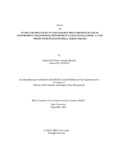| dc.contributor.advisor | Rahman, Mir Mehbubur | |
| dc.contributor.author | Sharmin, Surayia | |
| dc.date.accessioned | 2023-03-22T09:19:25Z | |
| dc.date.available | 2023-03-22T09:19:25Z | |
| dc.date.copyright | 2022 | |
| dc.date.issued | 2022-09 | |
| dc.identifier.other | ID: 20282016 | |
| dc.identifier.uri | http://hdl.handle.net/10361/18007 | |
| dc.description | This internship report is submitted in partial fulfillment of the requirements for the degree of Masters in Procurement and Supply Management, 2022. | |
| dc.description | Cataloged from PDF version of Internship Report. | |
| dc.description | Includes bibliographical references (page 33). | |
| dc.description.abstract | Sustainable Public Procurement (SPP) is a process by which government of the country seek
to achieve the appropriate balance between the three pillars of sustainable development -
economic, social and environmental - when procuring goods, services or works at all stages of
the project. In Bangladesh, Local Government Engineering Department (LGED) is one of the
largest public sector organizations in the country entrusted for planning and implementation of
rural, urban and small-scale water resources infrastructure development programs who
procures goods, works and services as a large scale.
A case study has been conducted with LGED officials of Upazila level addressing three aspects
of sustainability to know the present scenario of procurement practice and find out the
opportunities and barriers to adopt the sustainability in the public sector procurement in
Rupganj Upazila, Narayanganj.
From interview survey through the questionnaires it is found that the preparedness of the field
level professionals is quite satisfactory but due to different barriers the practices of
sustainability in procurement cannot be done effectively. A clear and formal commitment is
necessary between the top level of government and Upazila level through proper channel for
effective sustainable development. Besides different awareness programs for other entities,
contractors, local leaders and mass beneficiaries about public procurement are required to ease
the sustainable public procurement process. Besides, reduction of major obstacles, such as,
financial barriers, land acquisition difficulties and bureaucratic complexities may create more
scope to adopt sustainability in procurement for LGED at field level.
Advanced research needs to be conducted in order to get a deeper insight into the sustainability
issue in relation to the public procurement at Upazila. | en_US |
| dc.description.statementofresponsibility | Surayia Sharmin | |
| dc.format.extent | 39 pages | |
| dc.language.iso | en | en_US |
| dc.publisher | Brac University | en_US |
| dc.rights | Brac University Internship reports are protected by copyright. They may be viewed from this source for any purpose, but reproduction or distribution in any format is prohibited without written permission. | |
| dc.subject | Sustainability | en_US |
| dc.subject | Procurement | en_US |
| dc.subject | Preparedness | en_US |
| dc.subject | Opportunities | en_US |
| dc.subject | Barriers | en_US |
| dc.subject | Beneficiaries | en_US |
| dc.subject.lcsh | Government purchasing--Law and legislation--Bangladesh. | |
| dc.title | Scope and practices of sustainable procurement in Local Government Engineering Department (LGED), Bangladesh: A case study on Rupganj Upazila, Narayanganj | en_US |
| dc.type | Internship report | en_US |
| dc.contributor.department | Brac Institute of Governance and Development, Brac University | |
| dc.description.degree | M. Procurement and Supply Management | |

